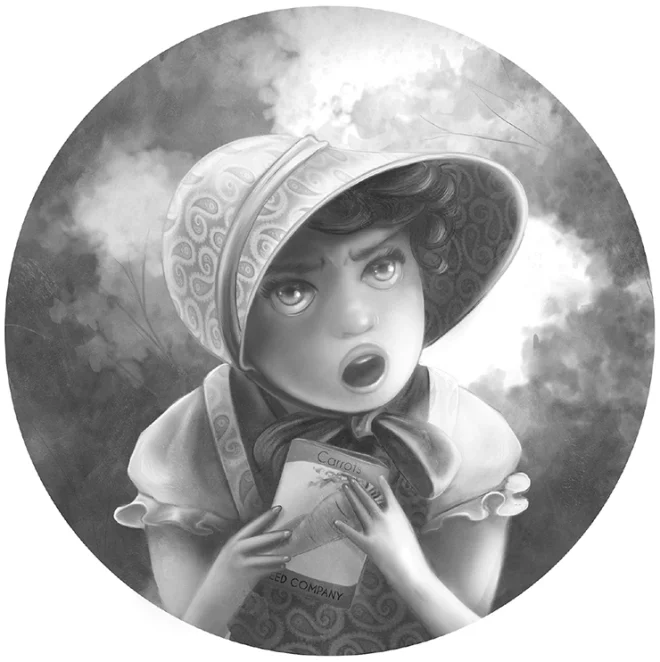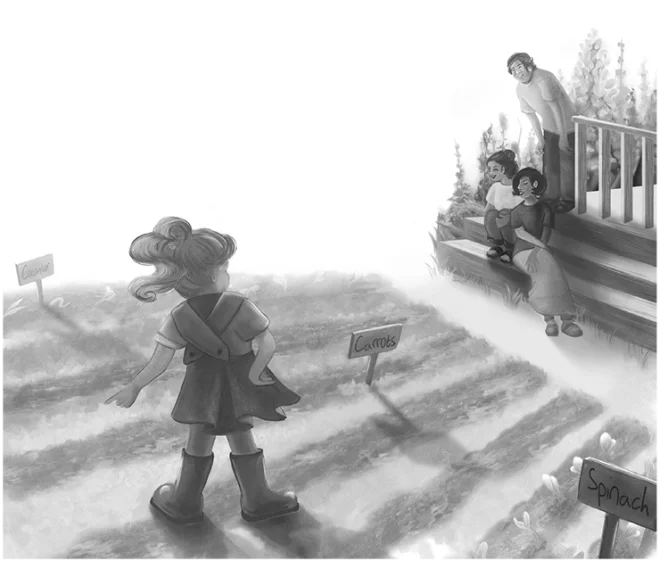My sisters and I were the children of gardening parents, and it was ordained that we should all be gardeners. As infants, each of us watched the rest of the family garden from under the hood of a battered old wicker carriage. It had high wheels and a tilted handle that was ideal for older siblings to swing on—if the baby inside weighed enough to keep it from tipping over. Almost as soon as we could walk, we were in the garden with the diggers and seeds.
I well remember my first planting day. I had graduated from the wicker carriage, and since I was the youngest, it had gone into the attic. It was a bright May morning. I was wearing my new gardening outfit. This consisted of a sun-yellow shirt and a grass-green pair of overalls with a matching old-fashioned sunbonnet that was my pride and joy. In one hand, I held a shiny new digging tool, in the other a package of seeds. I was going to plant carrots, which I loved. The picture on the packet showed me how big and orange they would be. Mine were going to be even bigger. Mine were going to be the best carrots ever grown.
Does pride go before a fall? It was true for me. I stepped into the garden, tripped, and fell face first into the dirt. Spluttering and spitting, I struggled to get up. My sister Ruth came to my rescue. Pulling me upright, she brushed me off and cleaned most of the dirt out of my mouth—my first taste of gardening. But I still had my digger, my packet of seeds, and the vision of my carrots—big and bright and ORANGE.

My sister showed me which row was mine and told me how far apart to put the seeds. I was ready to go! I sat down in the dirt and opened the little package of seeds. I was astonished! There was nothing there but a pile of tiny specks! How could these tiny specks turn into the big orange carrots I imagined? Someone had obviously put the wrong seeds in the packet. I was indignant. I looked at my sister and said, “These aren’t carrot seeds! There’s just dirt in here! Look! They aren’t even orange!”
Ruth laughed and said, “Great oaks from little acorns grow.” That made me even more indignant. I couldn’t see what acorns had to do with carrots. No sir! I had been defrauded.
By this time, I was getting to the foot-stomping stage. I wanted real carrot seeds!
It took much explaining—and I still was not quite convinced that any carrot would grow from a seed that small. But I finally agreed to plant them anyway and see what happened. The morning grew hot while I sat in my row carefully placing them equidistant from each other. There was a stubborn streak in me. I stuck with things to the end. I refused to go to lunch when noon came. It was about 2:00 before I planted my last seed. Then on hands and knees, I crawled the length of the row and carefully covered the seeds and patted them down with my hands. Only then did I go to lunch. Everyone else had eaten long ago.

My mother met me on the porch with milk and a sandwich. I was a little wilted, but proud of my achievement. Ruth told me it would take days before the carrots started to grow. My father watered the garden every evening, while I stood by and watched. I visited my row every morning, hoping to see signs of growth, but it was always the same—nothing. Now I was sure those specks were not carrots. They were nothing but a little pile of dirt.
After about the fourth day, I decided to make sure. I slipped out one evening after supper and dug a little in my row. Sure enough, nothing! I couldn’t find one of those seeds. I bet all the packets my family had planted contained only dirt. Outraged, I marched to the house. The spit flew, and I stamped my feet. Soon the whole family gathered on the porch, and every one of them burst out laughing. Inviting them to follow, I marched back to the garden so I could show them nothing was coming up.
We stood there gazing across the field-sized plot where my father always planted enough to feed half of creation. I couldn’t see anything growing. Then my mother bent down and pointed out little green shoots coming up in the rows where we’d planted beans and corn. I was amazed. It was a miracle!
The next morning, my sister Martha came running in to announce that the carrots were up. I hurried into the garden, half-dressed, to look. Sure enough, there were the first green shoots of young carrots breaking through the dirt. I walked the length of the row, stopping to admire each delicate plant. They already had tiny feathered tops! After that, I visited my plants twice a day. I stopped just short of naming them.
At first, I was patient. But they grew so slowly! It was clear to me that the carrots were not doing their job, so I started talking turkey to them. I shouted a line I had heard my sister deliver to her ill-trained dog: “What is the meaning of this behavior?!” On other days I was nicer and spoke to them as if they were children who needed encouragement. The summer was interminable.
At last, one night at supper, my father announced, “Tomorrow we will dig the carrots.”
I clapped my hands with happiness. But I took exception to one thing. “I’m going to pull them up,” I declared, “one at a time.” My wise father simply nodded.
That night, lying in bed with Martha beside me, I couldn’t sleep. It was just like the night before Christmas. Only then we talked about presents. Martha wasn’t interested in lying awake to talk about carrots. “Good grief,” she said, turning away from me. “Who cares about an old carrot?”
I was dressed in my gardening clothes long before daylight, but my mother wouldn’t let me go out without breakfast. I swung on the kitchen door until she couldn’t stand the creaking.
“Go wake the others, while I finish making breakfast,” she ordered.
I ate mine in record time. Then I sat swinging my legs, wishing everyone else would hurry. They dawdled over their cereal. They ate pieces of banana one at a time. They drank their milk in tiny sips. I was ready to explode.
Finally my father said I could go. I shot out the door, went straight to my row, and looked down at the first carrot. I grasped its tall, green, feathered wand with both hands and pulled with all my might. It didn’t budge. I tugged and tugged. Still nothing. I tugged some more. Finally my father came out. “That’s why you have to dig them,” he said. “They are too big to slip out.”
He handed me a trowel and showed me how to dig them. It was hard. I finally let him help me. Martha brought a basket to put them in, but I wouldn’t let her help dig. I don’t think that bothered her much. When we were done, I stood back to admire the baskets full of bright, big, ORANGE carrots. They were beautiful. They were perfect. And they were mine.
I picked out a few for supper. My father helped me put the rest away in a cool place in the cellar. My mother peeled them, and I put them in a green glass dish. It set off their sun-bright orange. I stacked them in a perfect pyramid and stood back to admire them. As each member of the family came into the dining room, I pointed out the wonder of them, the perfection of them, the glory of them, the ORANGENESS of them. I was crazy about those car-rots. When we finally ate them, they were delicious.
“Anyone would think you had created the carrot,” my father said. “Maybe you should thank God for a good harvest.”
I thought about that. Until then, I hadn’t considered that God might have had anything to do with it. I had put the seeds in the ground. I had covered them up. And I had watched over them all summer long. Still, I had to acknowledge that God had created the seed. He’d made the sun and the rain that helped them grow, as well.
I smiled at my father and said, “God must love ORANGE, too!” ❖


 Previous
Previous

